#chinese vocab
Text
Chengyu containing only 1 tone (all 4 characters are the same tone)
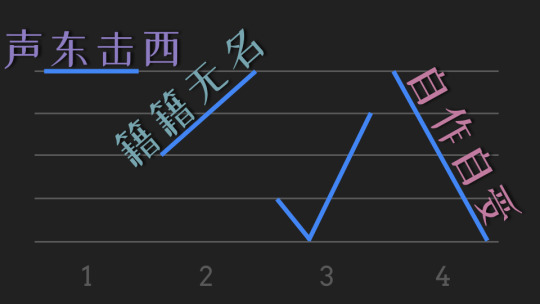
I had noticed several chengyu for which all 4 characters are the same tone. I was curious to find more of these chengyu, so I conducted some analysis on the chengyu in my Chinese Anki deck. Some notes about my criteria:
I decided to exclude chengyu like 从从容容 and 浩浩荡荡 that are the same two characters repeated.
If only one character was repeated, I did not exclude the chengyu.
Some of these chengyu do not fit the criteria if you study Taiwanese pronunciation. I marked them with an asterisks*.
1st tone
忧心忡忡 yōuxīnchōngchōng - deeply worried and sick at heart
息息相关 xīxīxiāngguān* - closely bound up / intimately related
居安思危 jūānsīwēi* - to think of danger in times of safety / to be vigilant in peacetime
声东击西 shēngdōngjīxī* - to threaten the east and strike to the west / to create a diversion
卑躬屈膝 bēigōngqūxī - to bow and bend the knee / fawning / bending and scraping to curry favor
惺惺相惜 xīngxīngxiāngxī* - people of talent appreciate one another / to sympathize with one another
2nd tone
籍籍无名 jíjíwúmíng - unknown / lacking fame and reputation
4th tone
跃跃欲试 yuèyuèyùshì - to be eager to give something a try
大错特错 dàcuòtècuò - to be gravely mistaken
对症下药 duìzhèngxiàyào - to prescribe the right medicine for an illness / to study a problem to find the right way to solve it / to take appropriate steps
就事论事 jiùshìlùnshì - to discuss sth on its own merits / to judge the matter as it stands / to consider the matter in isolation
上当受骗 shàngdàngshòupiàn - to be duped or deceived
自作自受 zìzuòzìshòu - to reap what one has sown / to stew in one's own juice
面面俱到 miànmiànjùdào - take care of everything / handle everything
各就各位 gèjiùgèwèi - (of the people in a group) to get into position / (athletics) On your mark!
Bonus:
If you are learning Taiwanese pronunciation, then here is an additional chengyu that will be all 2nd tone:
突如其来 túrúqílái - to arise abruptly / to arrive suddenly / happening suddenly
I pronounce it as tūrúqílái, so it does not fit the criteria for me.
[Definitions are adapted from MDBG.]
#chengyu#chinese#mandarin#mandarin chinese#chinese language#studyblr#langblr#chinese vocab#mandarin vocab#learning languages#language learning#chinese langblr#languageblr
199 notes
·
View notes
Text
exchanging fandom merch in 谷圈
homophones abound.....short vocab list on trading merch
谷子 [gǔzi] - millet = homophone for "goods"
吃谷 [chī gǔ] - eat millet = buying goods
谷圈 [gǔ quān] - millet circle = merch trading community
米 [mǐ] - rice = short for 人民幣 (RMB)
同人谷 [tóngrén gǔ] = doujin goods (fanmade merch)
6 - homophone for 留 (leave) = 遛一遛ID (can I have your WX ID)
初伤 [chū shāng] - initial injury = factory defects
薯条 [shǔ tiáo] - french fries = homophone for 数(量)调(查) = quantity survey, i.e. interest check for merchandise
切了 [qièle] - cut it = you/someone else bought the item
拼齐切 [pīn qí qiè] - evenly split - if you only want part of the set and want to split it with someone else after placing the order
不包不刀 [bù bāo bù dāo] - postage not included, no bargaining
对走 [duì zǒu] - 对 is homophone for 隊 (team) = selling in pairs
ddl - deadline (for payment)
云xx [yún] - cloud xx = unreleased items or items that are still being produced, or currently only exist online (in the cloud)
痛包 [tòng bāo] - painful bag = itabag, 痛 (ita/pain) refers to pain inflicted on the owner's wallet/bag or painfully embarrassing to look at
#chinese#mandarin#chinese studyblr#chinese langblr#langblr#studyblr#chinese vocab#tunastudies#my favorite is french fries lmfao
92 notes
·
View notes
Text
🌿🌕✨
外国的月亮比较圆 - “the moon is rounder in other countries”
A funny phrase I learned today, the equivalent of “the grass is always greener on the other side”!
Do you feel that way sometimes too? 🌝
#proverb#vocab#mandarin#chinese language#mandarin chinese#chinese#mandarin vocab#language learning#chinese vocab#mandarin langblr#mandarinblr#idiom#chinese idiom
393 notes
·
View notes
Text
音系学,音位学 - Phonology
音位学分析 yīnwèixué fēnxī - phonological analysis
音系表征 yīnxì biǎozhēng - phonological representation
心里表征 xīnlǐ biǎozhēng - mental representation
抽象表征 chōuxiàng biǎozhēng - abstract representation
单位 dānwèi - units
音段 yīnduàn - segment
音节 yīnjié - syllable
音节首 yīnjiéshǒu - onset
音节核 yīnjiéhé - nucleus
音节尾 yīnjiéwěi - coda
音拍 yīnpāi, 莫拉 mòlā - mora
音步 yīnbù - foot
莫拉理论 mòlā lǐlùn - moraic theory
音节长度 - syllable length
音位 yīnwèi - phoneme
最小对立体 zuìxiǎo duìlì tǐ - minimal pair
区别意义 qūbié yìyì - distinguish meaning
对立的 duìlì de - contrastive
边缘对立 biānyuán duìlì - marginal contrast
音位中和 yīnwèi zhōnghé - phonemic neutralization
音位变体 yīnwèi biàntǐ - allophone
环境 huánjìng - environment
条件变体 tiáojiàn biàntǐ - conditioned variant
自由变体 zìyóu biàntǐ - free variation (无条件变体)
预测 yùcè - predict
互补分布 hùbǔ fēnbù - complementary distribution
自然类 zìrán lèi - natural class
在一定条件下产生 "produced under certain conditions" (产生 chǎnshēng "give rise to, produce")
在其他实词中都呈现互补分布。"They all present complementary distributions in other content words."
如果有一群语音共享一个或多个发音或听觉特征,而且同一个语言的其他音没有,这群语音就组成一个自然类。"If a group of sounds shares one or more articulatory or auditory features, which are not shared by the other sounds of that language, then that group of sounds is a natural class."
音位配列 yīnwèi pèiliè, 语音组合法 yǔyīn zǔhé fǎ - phonotactics
规则 guīzé - rule
替换 tìhuàn - substitute, replace
语音同化 yǔyīn tónghuà - assimilation
语音异化 yŭyīn yìhuà - dissimilation
语音省略 yǔyīn shěnglüè - deletion, elision
插音 chāyīn - epenthesis, insertion
语音变换 yǔyīn biànhuàn - metathesis
补偿延长 bǔcháng yáncháng - compensatory lengthening
连音 liányīn- sandhi, liaison
变调 biàndiào - tone sandhi
底层表达 dǐcéng biǎodá - underlying representation (底层形式 dǐcéng xíngshì, 底层表现 dǐcéng biǎoxiàn)
表层表现 biǎocéng biǎoxiàn - surface form
自主音段音系学 zìzhǔ yīnduàn yīnxìxué - autosegmental phonology
特征 tèzhēng - feature
音层 yīncéng - tier, level (as used in phonological context)
自主音段音系学理论把不同的区别性特征放在不同的音层上。
超音段 chāoyīnduàn - suprasegmentals
韵律 yùnlǜ - prosody
语调 yǔdiào - intonation
音高 yīngāo - pitch
响度 xiǎngdù - loudness
重音 zhòngyīn - stress, accent
节奏 jiézòu - rhythm, timing
重音节奏 zhòngyīn jiézòu - stress-timed
音节节奏 yīnjié jiézòu - syllable-timed
音拍节奏 yīnpāi jiézòu - mora-timed
表征的模型 biǎozhēng de móxíng - representation models
样本理论 yàngběn lǐlùn - exemplar theory
自下而上的过程 zìxià'érshàng de guòchéng - bottom-up process
自上而下的过程 zìshàngérxià de guòchéng - top-down process
优选论 yōuxuǎn lùn - Optimality Theory
制约排列 zhìyuē páiliè - constraint ranking
忠实性制约 zhōngshí xìng zhìyuē - faithfulness constraint
标志性制约 biāozhì xìng zhìyuē - markedness constraint
候选项目 hòuxuǎn xiàngmù - candidate
其他啊啊啊 (other)
范畴性的 fànchóu xìng de - categorical
阶层性的 jiēcéng xìng de - gradient
感知 gǎnzhī - perceive
发音 fāyīn - produce (sound), pronounce, enunciate
#中文#汉语#mandarin#mandarin studyblr#langblr#chinese langblr#词汇#chinese vocab#mandarin vocab#vocab#I’ve been sitting on this post for like a year now cuz I couldn’t find translations of a few more terms I wanted#alas#idk I just wanted to post it finally and probably make another one for vocab abt syntax lol#since apparently that’s what my thesis is#and I’ve been talking a lot w a classmate who’s doing hers on Chinese syntax#fun stuff#linguistics#语言学
42 notes
·
View notes
Text
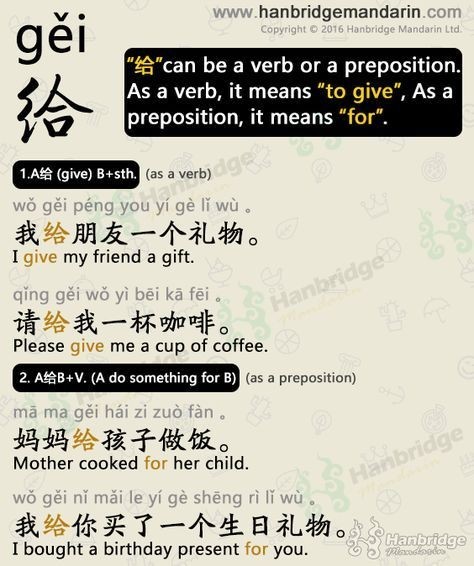
Guys, I swear the source website of this picture had helped me out so much both when I started learning chinese and now!
Link:
I don't usually recommend pinterest to find useful websites but I did find this website there somehow lol. Istg half the links of pinterest are unavailable or something.
#langblr#chinese langblr#mandarin langblr#mandarinblr#chineselangblr#chinese vocab#mandarin vocab#chinese vocabulary#chinese language#chinese studyblr#mandarin vocabulary#mandarin chinese#mandarin studyblr#mandarin#learn chinese#study chinese#chinese study#learn mandarin#study mandarin#learning mandarin#studying mandarin#langblog#language learning#languageblr#learning languages#zhongwen
209 notes
·
View notes
Text
Mandarin learning material recommendations:
My favorite Mandarin dictionaries:
—
MDBG
I’m not even gonna try listing all of the features because there’s just so many and I’ve used it for many years now and on a daily basis. Not to mention it is constantly updated. In terms of features and overall quality, MDBG is the best in my opinion.
MandarinSpot’s Annotator
Sometimes has slightly different definitions compared to MDBG, and someone it will have the definition for words that MDBG does not have entered yet. Also, it helpful for anyone who reads Chinese best horizontally as opposed to listed vertically like on MDBG.
Pleco (app)
Most similar to MDBG, but for your smart phone.
—
Important Note:
Please keep in mind that none of these dictionaries are perfect and language is constantly evolving, so new terms are not likely to be in any of these dictionaries.  there is not many moderators for these dictionaries so sometimes definitions and words won’t be entered in for weeks or even months.
If you find yourself with some thing that is clearly a word but does not have an English definition entered into either of these dictionaries it works best to look up the definition in Chinese on Baidu Dict or Google, or even check out Wikitionary/Wikipedia. 
—
PLEASE COMMISSION ME I BEG YOU
#chinese langblr#mandarin langblr#learn chinese#chinese lesson#chinese vocab#chinese to english#language learning#chinese language#language learning recommendation#language resource#language learning resources#language resources#mandarin learning#mandarin to english#study mandarin#learn mandarin#MDBG#study chinese#chinese learning#language learning material#study material
42 notes
·
View notes
Text
数学
数字 - shùzì - number
奇数的 - jīshùde - odd (number)
偶数的 - ǒushùde - even (number)
加 (法) - jiā (fǎ) - plus/to add
1加2等于3
减 (法) - jiǎn (fǎ) - minus/to subtract
3减2等于1
乘以 - chéngyǐ - times/to multiply
3乘以3等于9
除 (以) - chú (yǐ) - divided by
9除以3等于3
12除3等于4
等于 - děngyú - equals
点 - diǎn - point
二十点五 (12.5)
差 - chā - difference (after division)
积 - jī - product (after multiplication)
余数 - yúshù - remainder (left after division)
分数 - fēnshù - fraction
...分之... - ...fēnzhī... - used to make fractions
二分之一 (1/2)
五分之��� (4/5)
百分之 - bǎifēnzhī - percentage
百分之八十 (80%)
解 - jiě solution
more links:
ins.ell glossary
Columbia glossaries
LTL mandarin school
#i tend to lean towards the stem side of academia so i figured i would make a math focused post#also helpful for reading recipes with fractions#if people are interested i can make more with more complicated vocab#or maybe a recipe focused one with tblspoons etc?? the possibilities are endless#mandarin#m vocab#chinese#mandarin vocab#chinese vocab#mathematics#chinese langblr#mandarin langblr#langblr#language learning#learn chinese#learn mandarin#普通话
142 notes
·
View notes
Text
This post is about some of the non-flower flowers...
老花 Lǎo huā (lit. old flower) presbyopia. basically it's the phenomenon that makes things you see blurry, due to old age.
天花 tiān huā (lit. sky flower) smallpox. It's named after it's the rash/ blister caused by smallpox.
天花板 tiān huā bǎn (lit. sky flower board) ceiling. This is actually from back in the days when they painted the ceiling with lotus flower.
豆花 dòu huā (lit. bean flower) a soft tofu dessert. Which comes from the full name 豆腐花, meaning tofu that is not pressed. But what does it have to do with flower? no idea.
棉花 mián huā (lit. cotton flower) cotton. The white fluffy part of the cotton plant, which is not the flower part but the boil of the plant.
蔥花 cōng huā (lit. onion flower) diced green onion. Note that nothing else diced is named in this way. If you say 洋蔥花 (not a real term!) I'll think of the fried onion appetizer awesome blossom.
蛋花 dàn huā (lit. egg flower) when you beat eggs and cook them in soup to make them look like...scattered...soft..silky pieces of eggs.
and a fun one: 花心 huā xīn (lit. flower heart) adjective to teasingly describe someone who have romantic interests in others easily. This is usually used for CRUSHES and not actual relationship, which makes the term kind of funny and somewhat harmless.
It's someone who tends to develop crushes easily and often on different people. Can be used with both guys and girls. The opposite term would be 專情 zhuān qíng.
Also, 花心大蘿蔔 huā xīn dà luóbo is a playful way to call a guy that likes a bunch of girls. (Lit means flower heart big turnip. )
This really shows how Chinese people *date* differently than the western culture, doesn't it?
104 notes
·
View notes
Text
Editing your blog in Chinese:
编辑外观
biānjí - wàiguān
edit appearance
保存
bǎocún
save (lit. keep)
背景
bèijǐng
background
重点文字
重点:zhòngdiǎn: emphasis
文字:wénzì: character
accent
显示头像
xiǎnshì tóuxiàng
show avatar
头像
tóuxiàng
profile picture
帖子
tiězi
posts
喜欢
xǐhuan
likes
选择一张图片
选择:xuǎnzé: choose
一:yī: a
张:zhāng: classifier for flat things
图片:túpiàn: picture
select a picture
part 1
#mandarin langblr#langblr#langblr chinese#chinese langblr#langblr mandarin#vocabulary#chinese vocab#chinese-vocab-callie
72 notes
·
View notes
Text

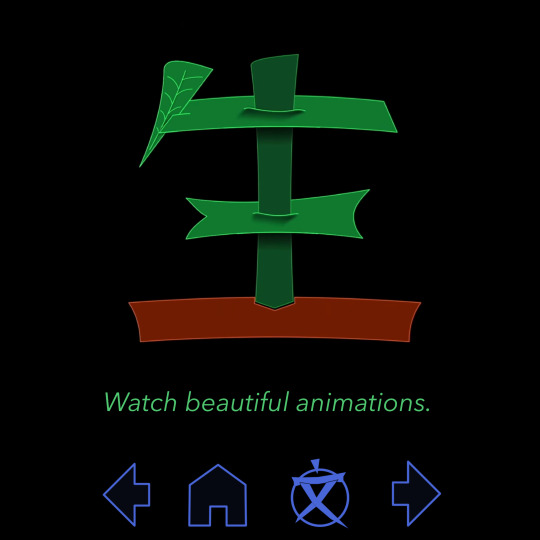
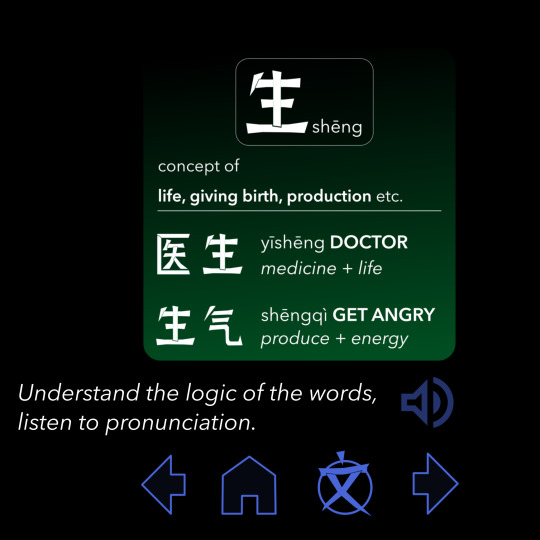

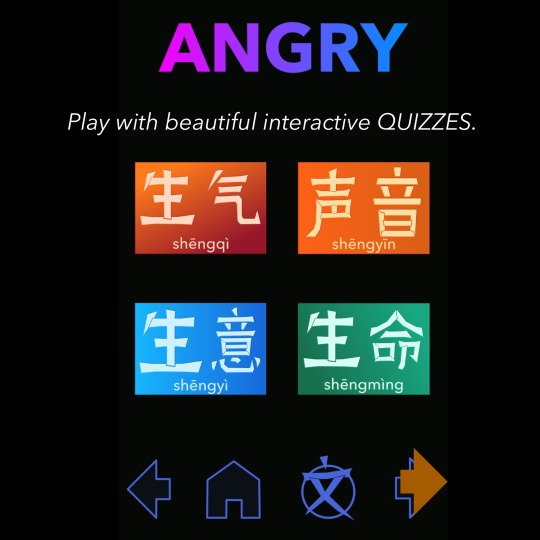

Just go to chineseffect.com and experience it for yourself. :)
It is as simple as that.
#chinese#mandarin#learn chinese#learn mandarin#chinese langblr#mandarin langblr#edublr#langblr#chinese vocabulary#mandarin edublr#study chinese#study mandarin#zhongwen#hanyu#中文#汉语#chinese vocab#mandarin vocab#chinese app
5 notes
·
View notes
Text
. ݁₊ ⊹ 🍭🍨 𝘋𝘦𝘴𝘴𝘦𝘳𝘵 𝘝𝘰𝘤𝘢𝘣𝘶𝘭𝘢𝘳𝘺 🍧🍰 . ݁˖
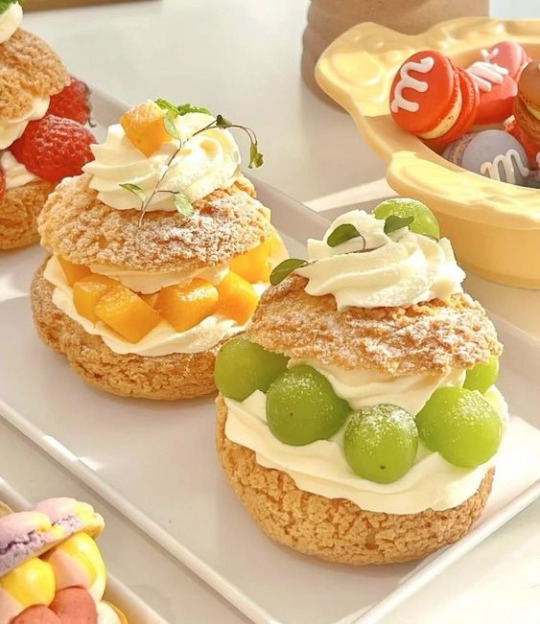
// Candy //
Cotton candy ~ 棉花糖 (miánhuātáng)
Note: 'marshmallow' has the same name as cotton candy in Chinese
Gummy ~ 软糖 (ruǎntáng)
Lollipop ~ 棒棒糖 (bàngbàngtáng)
Fudge ~ 乳脂软糖 (rǔzhī ruǎntáng)
Caramel ~ 焦糖 (jiāotáng)
Jellybean ~ 果冻豆 (guǒdòng dòu)
Toffee ~ 太妃糖 (tàifēi táng)
Liquorice ~ 甘草 (gāncǎo)
// Baked Sweets //
Cupcake ~ 杯子蛋糕 (bēizi dàngāo)
Brownie ~ 布朗尼 (bùlǎngní)
Sponge cake ~ 海绵蛋糕 (hǎimián dàngāo)
Lava cake ~ 熔岩蛋糕 (Róngyán dàngāo)
Black forest cake ~ 黑森林蛋糕 (hēisēnlín dàngāo)
Cheesecake ~ 乳酪蛋糕 (rǔlào dàngāo)
Tiramisu ~ 提拉米苏 (tílāmǐsū)
Scone ~ 司康 (sīkāng)
Macaron ~ 马卡龙 (mǎkǎlóng)
Waffle ~ 华夫饼 (huáfū bǐng)
Tart ~ 塔 (tǎ)
Crepe ~ 可丽饼 (kělì bǐng)
Pie ~ 派 (pài)
Chocolate chip cookie ~ 巧克力碎片饼干 (qiǎokèlì suìpiàn bǐnggān)
Donut ~ 甜甜圈 (tiántiánquān)
Brulee ~ 烤布蕾 (kǎo bùlěi)
Creampie ~ 奶油派 (nǎiyóu pài)
Cinnamon bun ~ 肉桂卷 (ròuguì juǎn)
Gingerbread ~ 姜饼 (jiāngbǐng)
Red velvet cake ~ 红色天鹅绒蛋糕 (hóngsè tiān'é'rónghuá dàngāo)
// Frozen Desserts //
Sherbet ~ 雪葩 (xuěpā)
Gelato ~ 吉拉朵 (jílāduǒ)
Sundae ~ 圣代 (shèngdài)
Shaved ice ~ 刨冰 (bàobīng)
Ice cream ~ 冰激凌 (bīngjīlíng)
Note: another common name is 冰淇淋 (bīngqílín).
Popsicle ~ 冰棍儿 (bīnggùn'er)
// Misc. //
Custard ~ 奶黄 (nǎihuáng)
Puff ~ 泡芙 (pàofú)
Popcorn ~ 爆米花 (bàomǐhuā)
Milkshake ~ 奶昔 (nǎixī)
Jello ~ 果冻 (guǒdòng)
Oreo ~ 奥利奥 (àolì'ào)
// Common Asian Desserts //
Mochi ~ 麻糬 (máshǔ)
Tanghulu ~ 糖葫芦 (tánghúlu)
Black sesame soup ~ 黑芝麻糊 (hēi zhīma hú)
Swallow's nest ~ 燕窝 (yànwō)
Sago pudding ~ 西米布丁 (xīmǐ bùdīng)
Snow fungus soup ~ 雪耳糖水 (xuě'ěr tángshuǐ)
Osmanthus Jelly ~ 桂花糕 (guìhuā gāo)
Grass jelly ~ 仙草 (xiāncǎo)
// Example Text //
https://www.sohu.com/a/443013219_120949919
口味最“奇怪”的4种糖果 -> the four candies with the strangest flavours.
1、星空棒棒糖 -> planet lollipops
星空棒棒糖有名的高颜值糖果,大部分的女生都有买过,或是男生情人节买来送女朋友都有了解过。-> Planet lollipops are popular for their appearance, lots of women have already purchased them before, or men who, on Valentine's day gifted it to their girlfriends, have understood.
它的味道你尝过后就会觉得“这是什么沙雕玩意儿,我吃了塑料吗?”,有这种感觉并不奇怪,星空棒棒糖大部分都是甜苦甜苦的味道,有些还带着塑料的气味,吃完就怀疑人生,估计这个糖果也就只能当做摆设。-> After tasting its flavour, you will think: "what is this sand sculpture-like thing, am I eating plastic?" Having this kind of feeling isn't exactly strange, planetary lollipop largely have a bittersweet flavour, some lollipops even have a plastic odour, after eating it, you'll question your life, seems like this kind of candy is only used for decoration.
2、榴莲糖 -> durian candy
...打开包装就是浓浓的榴莲味,吃到嘴里就感觉是三里往外都是这个榴莲味 -> upon opening the package are the dense/strong durian smells, eating them makes you feel that the durian smell is everywhere within a 3 mile radius.
3、姜汁糖 -> ginger candy
姜汁糖里面就是有大量的姜味,吃的第一口还是上面糖味,含一会后姜味就显露出来了,你会有一种姜辣的感觉,一直猛吸气想要减少这个辣味,没想到后面越吃越辣,让人有点受不了,吃到一半就吐了,这种一般都是家里的老人才会买,老人很喜欢这种甜辣的感觉,甚至吃起来还想喝一两口小酒。-> Within ginger candy is a considerable amount of ginger flavour, after eating the first bite, the first taste is sweet, after sucking on it for a bit, the ginger flavour will come out and you get have a spicy ginger feeling. Keep inhaling sharply, wanting to reduce this spiciness, not knowing that more and more spiciness will follow, intolerable, spat it out halfway through, this kind of candy will typically be bought by a family's older individuals, elders really like this kind of spicy-sweet feel, to the point of also wanting to drink a couple gulps of liquor.
世界上最好吃的十种甜点,吃过六种,算我服!-> 10 of the world's most delicious desserts, eaten 6 types, count me in!
1、布朗尼蛋糕--美国 -> Brownie--America
布朗尼蛋糕属于重油蛋糕的一种,但它和一般重油蛋糕的区别在于通常较薄且较结实,不像普通蛋糕那样松松的, 而且一定是巧克力口味 -> Brownies are considered a type of pound cakes, but they are different from regular pound cakes in that they are usually on the thinner and sturdier side, unlike the regular cakes which are fluffier, and brownies need a chocolate flavour.
2、提拉米苏--意大利 -> Tiramisu--Italy
提拉米苏是一种带咖啡酒味儿的意大利甜点 -> tiramisu is a type of coffee-flavour containing Italian dessert.
10、乳酪蛋糕--阿拉伯 -> Cheesecake--Arabic
这类蛋糕介于蛋糕和甜点之间,因而越来越受人关注 -> this type of cake is a cross between cakes and desserts, and because of this, more and more people have given it attention.
#chinese#langblr#language learning#vocab list#aesthetic#chinese langblr#chinese vocabulary#chinese cuisine#chinese culture#dessert#sweetcore#chinese vocab
3 notes
·
View notes
Text
Chinese Time of Day Vocabulary
I’ve been keeping a list of words/characters related to times of day since last year. You probably know basic words like 早上, 上午, 晚上, etc. But there are so many other words and characters you may encounter in your language journey!
Note: this list isn’t meant to be complete.
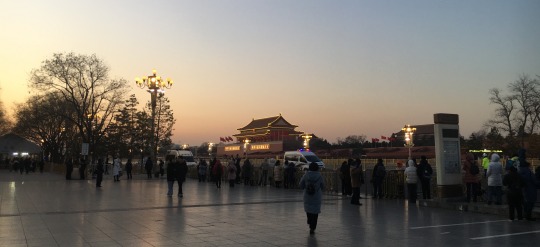
Sunset (I think) by Tian’anmen Square about 3 years ago.
Dawn/early morning
天亮 tiānliàng - dawn / daybreak
日出 rìchū - sunrise
早 zǎo - early / morning / Good morning! / long ago / prematurely
一大早 yīdàzǎo - at dawn / at first light / first thing in the morning
早上 zǎoshang - early morning
旭 xù - dawn / rising sun
昕 xīn - dawn
晓 xiǎo - dawn / daybreak / to know / to let sb know / to make explicit
破晓 pòxiǎo - daybreak / dawn
晗 hán - before daybreak / dawn about to break
晞 xī - dawn / to dry in the sun
晨 chén - morning / dawn / daybreak
凌晨 língchén - very early in the morning / in the wee hours
早晨 zǎochén - early morning
晨曦 chénxī - first rays of morning sun / first glimmer of dawn
清晨 qīngchén - early morning
朝 zhāo - morning
朝阳 zhāoyáng - the morning sun
黎明 límíng - dawn / daybreak
The single characters above can be found in Chinese names. Some are quite common.
Daytime
午 wǔ - 7th earthly branch: 11 a.m.-1 p.m., noon
上午 shàngwǔ - morning
下午 xiàwǔ - afternoon
中午 zhōngwǔ - noon / midday
午前 wǔqián morning / a.m.
午后 wǔhòu - afternoon
昼 zhòu - daytime
白昼 báizhòu - daytime
白天 báitiān - daytime / during the day / day
白日 báirì - daytime / sun / time
Dusk/evening
晚 wǎn - evening / night / late
傍晚 bàngwǎn - in the evening / when night falls / towards evening / at night fall / at dusk
夕 xī - dusk / evening / Taiwan pr. xì
夕阳 xīyáng - sunset / the setting sun
天黑 tiānhēi - to get dark / dusk
日落 rìluò - sundown / sunset
暮 mù - evening / sunset
汐 xī - night tides / evening ebbtide / Taiwan pr. xì
霞 xiá - rose-tinted sky or clouds at sunrise or sunset
晚霞 wǎnxiá - sunset glow / sunset clouds / afterglow
彩霞 cǎixiá - clouds tinged with sunset hues
黄昏 huánghūn - dusk / evening / nightfall
Night
夜 yè - night
半夜 bànyè - midnight / in the middle of the night
夜晚 yèwǎn - night
夜深人静 yèshēnrénjìng - in the dead of night (idiom)
夜色 yèsè - night scene / the dim light of night
夜里 yèli - during the night / at night / nighttime
夜间 yèjiān - nighttime / evening or night
大半夜 dàbànyè - the middle of the night
深夜 shēnyè - very late at night
黑夜 hēiyè - night
宵 xiāo - night
晚间 wǎnjiān - evening / night
Now hopefully you have some more words to describe beautiful sunrises and sunsets and everything in between 🌄🌇
#chinese#mandarin#mandarin chinese#chinese language#vocab#vocab list#vocabulary#chinese vocab#mandarin vocab#langblr#studyblr#chinese langblr#chinese studyblr#mandarin langblr#mandarin studyblr#learn chinese#learning chinese#study chinese#studying chinese#learn mandarin#learning mandarin#study mandarin#studying mandarin#language learning#learning languages#language stuff#language study#language#languages
1K notes
·
View notes
Text
chinese drawing vocab (绘圈常用名词)
for those interested in navigating the online art world in chinese, here's a list of common terms and abbreviations that you might see (translated from zhihu) 🎨
terms
風格 [fēnggé] - art style
人设 [rén shè] - persona
兽设 [shòu shè] - fursona
摸鱼 [mō yú] - doodles, derived from idiom 【浑水摸鱼】 - although the original meaning is "fishing in troubled waters" it's currently used to describe people being lazy/not working hard
劳斯 [láo sī] - homophonic way to say 老师 (teacher) , in addition to 太太,大大,大触, 卡密 -- can be honorific, but 老師 is also just a common way to refer to artists
日绘 [rì huì] - daily drawing
Q版/SD [q bǎn] - chibi (Q = cute, SD = super deformed)
击鼓传画 [jī gǔ chuán huà] - art telephone
绘圈小警察 [huì quān xiǎo jǐngchá] - referring to people who accuse artists of plagiarism/tracing without evidence (direct trans: little art policemen)
抄袭狗 [chāoxí gǒu] - copycat (or dog)/art thief
abbreviations
ACG - animation, comics, and games
CN - cosplayer name
zll (再练练) [zài liàn liàn] - keep practicing
compliments
awsl (阿我死了) [Ā wǒ sǐle] - ah, i'm dead! -- will also see “阿伟死了” (a-wei's dead, a typo), which, after many b站barrages, becomes "阿伟乱葬岗" (a-wei's mass grave)
tql (太强了/太巧了) [tài qiángle/tài qiǎole] - "too strong" (more common usage) or "what a coincidence"
可可 [kěkě] - cute (derived from 可愛)
comments
腿一个 [tuǐ yīgè] - showing your current drawing's progress, directly trans. as "one leg," i.e. showing just the leg -- it's a play on words for 推 (push), i.e. pushing/posting progress
commissions
约稿 [yuē gǎo] - commission/request
接单 [jiē dān] - direct trans. = to accept orders, a less formal way of saying commissions
参考素材/材料 [cānkǎo sùcái/cáiliào] - references
买断 [mǎi duàn] - autobuy for an auction
白菜 [báicài] - high quality, low price art (direct trans: cabbage)
可小刀 [kě xiǎodāo] - haggling prices; 小刀/大刀/自刀 = small/big/self-haggle
出模 [chū mó] - bases/templates
构图 [gòutú] - composition
#chinese#mandarin#chinese language#studyblr#langblr#chinese vocab#tunastudies#chinese langblr#mandarin langblr
115 notes
·
View notes
Text
🧑🔬🧑🔬🧪🧪 Chemical elements (化学元素) 🥼🥼⚗️⚗️
I have learned something amazing which is that the Chinese word for sodium (Na) is … 钠 (nà)! If only they all matched like that!!
Ex: 低钠酱油 (dī nà jiàng yóu) - low sodium soy sauce
Sometimes you may see the word 卤 (鹵/滷,lǔ, halogen or salt) used to describe dishes or sauces, such as 卤肉饭 (lǔ ròu fàn, braised pork rice), 打卤面 (dǎ lǔ miàn, noodles with thick gravy), 卤虾油 (lǔ xiā yóu, shrimp sauce).
Here is the first three rows of the periodic table!
Hydrogen (H) - 氢 (qīng)
Helium (He) - 氦 (hài)
Lithium (Li) - 锂 (lǐ)
Beryllium (Be) - 铍 (pí)
Boron (B) - 硼 (péng)
Carbon (C) - 碳 (tàn)
Nitrogen (N) - 氮 (dàn)
Oxygen (O) - 氧 (yǎng)
Fluorine (F) - 氟 (fú)
Neon (Ne) - 氖 (nǎi)
Sodium (Na) - 钠 (nà)
Magnesium (Mg) - 镁 (měi)
Aluminum (Al) - 铝 (lǚ)
Silicon (Si) - 硅 (guī)
Phosphorus (P) - 磷 (lín)
Sulfur (S) - 硫 (líu)
Chlorine (Cl) - 氯 (lǜ)
Argon (Ar) - 氩 (yà)
And a few more useful ones:
Iron (Fe) - 铁 (tiě)
Gold (Au) - 金 (jīn)
Silver (Ag) - 银 (yín)
Examples:
地铁 (dì tiě) - subway; short for (地下铁道, “underground iron path”)
金银 (jīn yín) - gold and silver, can be used to refer to ancient currency
穿金戴银 (chuān jīn dài yín) - to be dressed in gold (clothes) and silver (ornamentation) (idiom)
Radical practice
Notice how all of the above (except gold) have a radical based on 金 (钅, metal, gold), 气 (air, gas), or 石 (stone). Makes sense based on each element right? ;)
#vocab#mandarin vocab#mandarin#chinese language#mandarin chinese#chinese#language learning#chinese vocab#chemistry#chemical elements#mandarin langblr#chinese langblr#langblr
199 notes
·
View notes
Text
Chinese idioms of the week
时时刻刻 [shíshíkèkè] - constantly; all the time
引经据典 [yǐnjīngjùdiǎn] - to quote the classical texts
胡说八道 [húshuōbādào] - to talk nonsense
乱七八糟 [luànqībāzāo] - in a complete mess; at sixes and sevens
不伦不类 [bùlúnbùlèi] - nondescript; neither fish nor fowl
不明不白 [bùmíngbùbái] - unclear, vague, for no reason
大喊大叫 [dàhǎndàjiào] - to scream loudly
日日夜夜 [rìrìyèyè] - day and night; day in, day out
哭哭啼啼 [kūkutítí] - to cry continuously
筋疲力尽 [jīnpílìjìn] - to be exhausted
下定决心 [xiàdìngjuéxīn] - to make a firm resolution
毫无疑问 [háowúyíwèn] - without a doubt; certainly
吞吞吐吐 [tūntūntǔtǔ] - to mutter and mumble
仅此而已 [[jǐncǐéryǐ] - just this and nothing more
一五一十 [yīwǔyīshí] - (of narrating) in full detail
井然有序 [jǐngrányǒuxù] - orderly; in apple-pie order
不好意思 [bùhǎoyìsi] - too embarrassed or shy to do something
无关紧要 [wúguānjǐnyào] - unimportant
日积月累 [rìjīyuèlěi] - to accumulate over a long period
事先通知 [shìxiāntōngzhī] - to announce in advance
夸夸其谈 [kuākuāqítán] - to boast; to talk big
All of these I encountered while reading the book <鞋带> by Domenico Starnone. It's a translation from Italian. I would recommend it for those who have an intermediate level. The language is quite simple and the sentences are short which is good for language learning. The overall story is also engaging.
#chengyu#chinese idioms#chinese#mandarin#idioms#language learning#language study#reading#chinese vocab#mandarin vocab#chinese langblr#foreign languages#languageblr
11 notes
·
View notes
Text
Hey guys, look at this chinese poem I found!
Hanzi:
施氏食狮史
石室诗士施氏, 嗜狮, 誓食十狮。
氏时时适市视狮。
十时, 适十狮适市。
是时,适施氏适市。
氏视是十狮, 恃失势,使是十狮逝世。
氏拾是十狮尸, 适石室。
石室湿,氏使侍拭石室。
石室拭, 氏始试食是十狮。
食时, 始识是十狮, 实十石狮尸。
试释是事。
Pinyin :
Shīshì shíshī shǐ
shíshì shī shì shī shì, shì shī, shì shíshí shī.
Shì shí shíshìshì shì shī.
Shí shí, shì shí shī shì shì.
Shì shí, shì shī shì shì shì.
Shì shì shì shí shī, shì shī shì, shǐ shì shí shī shì shì.
Shì shíshì shí shī shī, shì shíshì.
Shíshì shī, shì shǐ shì shì shí shì.
Shí shì shì, shì shǐ shì shí shì shí shī.
Shí shí, shǐ shí shì shí shī, shí shí shí shī shī.
Shì shì shì shì.
English translation:
Shi's history of eating lions
Shi Shishi, a poet in the stone room, was fond of lions and swore to eat ten lions.
It is always appropriate to see the lion in the city.
At ten o'clock, the ten lions are suitable for the city.
It's time for Shishi's market.
Shi regarded the ten lions as ten lions, and lost his power, so that the ten lions died.
Shi Shi is ten lion corpses, suitable for stone chambers.
The stone room was wet, so the clergyman wiped the stone room.
The stone room was wiped, and Shi Shi first tried to eat ten lions.
When eating, the first consciousness is ten lions, which are actually ten stone lion corpses.
Explanation is a thing.
•••
I am not ok-
#chinese langblr#mandarin langblr#mandarinblr#langblr#language learning#languageblr#langblog#china#learning chinese#chinese#mandarin vocab#mandarin#chinese poem#chinese poetry#shi#study chinese#learning mandarin#chinese vocab#learn chinese#chinese study#learning languages#languages
218 notes
·
View notes